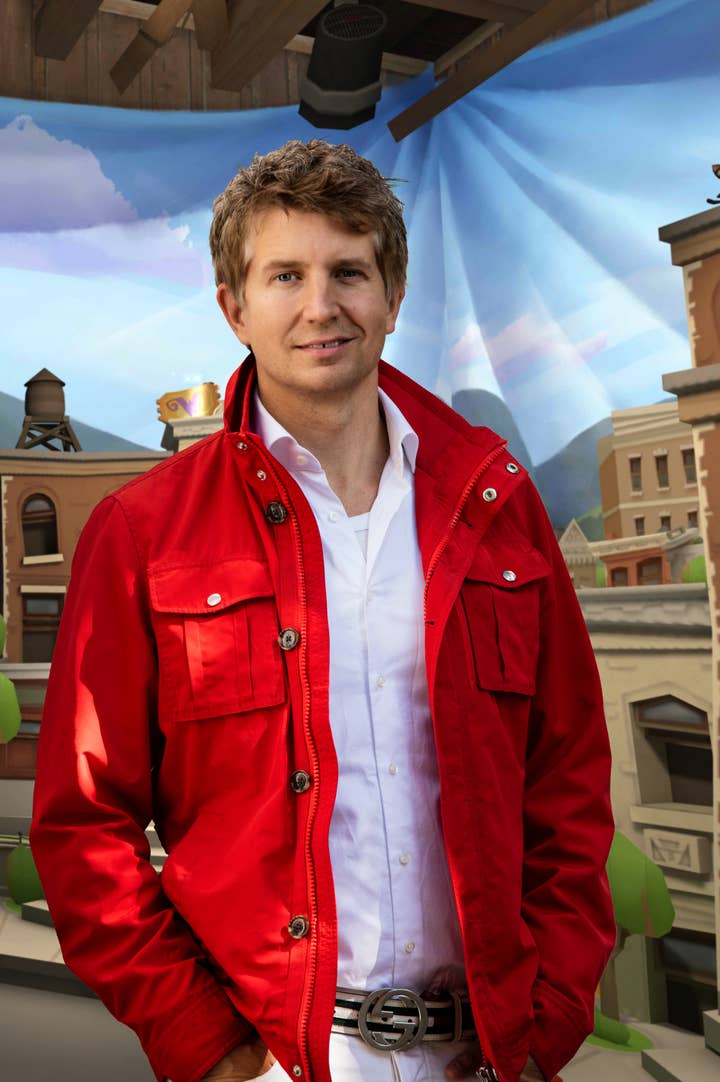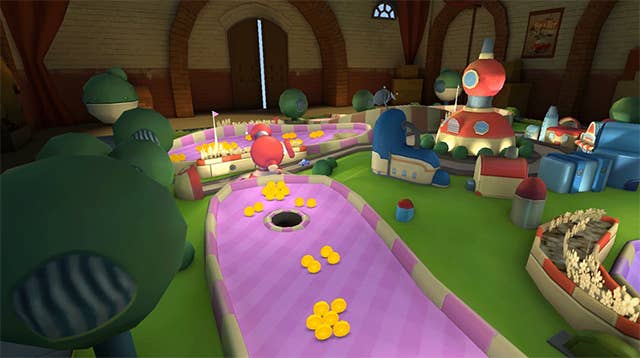“I wouldn't want to see virtual reality wasted on a few hardcore gamers”
Resolution's Tommy Palm stresses that VR's potential goes beyond games and entertainment - and mobile may be the key
For all the talk of virtual reality becoming a mainstream proposition, it's also easy to argue that the technology in its current form primarily appeals to core gamers. While the variety of markets turning to virtual reality as the future of their industry is increasing, it is the video games industry that has done the most to define the medium and offer what to some must seem like the most obvious application.
But while Tommy Palm, long-time proponent of VR and CEO at Resolution Games, can appreciate the argument that virtual reality is most attractive to the core, he maintains that this is the audience that will ultimately be left wanting - at least, at first. Instead, he believes VR developers should be targeting a much broader audience.
"In order to open up for a wider audience, you really need to work on making accessible content and unfortunately I think a lot of traditional hardcore gamers are going to be disappointed."
Tommy Palm, Resolution Games
"Anyone can understand VR instantly," he says. "It can be super intuitive. I showed my grandmother, who was over 100 years old, and she instantly understood it because you're virtually teleported to another place, and that's an incredible thing.
"In order to open up for that audience, you really need to work on making accessible content and unfortunately I think a lot of traditional hardcore gamers are going to be disappointed. They have a vision that they want to play Skyrim online in VR, where they can go round and manipulate everything. It's not going to be like that from the beginning.
"It takes many years to create really big game experiences and game worlds like that. So it will take some time. 2016 is the first year where we have consumer hardware out for VR, and you're going to have to give us game developers some time before we have those really rich and big experiences."
While he acknowledges that VR will eventually cater to those longing for immersive Skyrim-like experiences, he stresses that this is not the most important audience for the technology, nor is it the only opportunity for developers to have an impact on the medium.
"I wouldn't want to see virtual reality wasted on a few hardcore gamers because it has such a big opportunity to offer something to everyone," he says. "The challenge is out there to create very intuitive content that helps people understand why this can be a game-changer."

The consensus is that the VR industry has yet to create that 'killer app', the must-have title that sells both the technology and hints at its future, and Palm says the studio that finally creates this "could be anyone". He even suggests it might not have to be something completely unique, but instead a previous formula that offers a more compelling experience though VR.

"We've seen that on mobile phones," he says. "Nobody knew that Minecraft was going to be one of the biggest iPhone games."
But to find that killer app, or even to explore the full potential of virtual reality, developers need to understand the technology is about more than just games. Palm suggests it could be used for everything from helping people learn languages to creating 3D characters and environments. He even believes virtual reality could have the same impact on our daily lives as the advent of mobile phones.
"The challenge is for us developers to start creating a vast ocean of different types of apps - not only games, but also interesting things in communication, education, productivity," he says. "We will use VR for a lot of things that we can't even imagine today - much like it was very hard to understand what you needed a mobile phone for in the beginning. It's very similar to that revolution. People used to say 'well, I don't really need to be reached when I'm not at home' - that's exactly the situation with VR."
"I wouldn't want to see virtual reality wasted on a few hardcore gamers because it has such a big opportunity to offer something to everyone."
Tommy Palm, Resolution Games
This year has been an important milestone for virtual reality thanks to the commercial release of Vive, Oculus and PlayStation VR, but these high-end devices have drawn much of the attention from a platform some argue will define the future of the medium: mobile.
Analysts and experts have previously predicted mobile will be instrumental in driving both the growth and mainstream awareness of virtual reality, thanks largely to its low entry price and the ubiquity of smartphones - and Palm believes these factors cannot be understated.
"[It means] there are going to be so many more people that can try it out and start to see how useful VR can be," he says. "VR really is one of those things you need to test for yourself, and just finding the space to set up a HTC Vive and keeping that space dedicated to that is very, very difficult. I have one myself at home, but it's very easy for something else to find its way into that area, or to find someone has taken the extension cord you need when you next go to play.
"[A smartphone] has the capability of still producing excellent VR with only a headset and a controller. I think that is going to be extremely accessible."
Having developed multiple games for Gear VR as well as Daydream launch title Wonderglade, Palm acknowledges that while mobile virtual reality has the potential to reach the widest possible audience, it is not without "some rather hard restrictions".
"We have about 200 times less performance than PC and console, roughly," he observes. "So we get a maximum of roughly 50,000 polygons for a scene, while PC can do several million. That's one of the things we at Resolution tried to make the most of. Look at the [comic-style] graphics of Wonderglade. If you tried to go for realistic simulations, you would see that 50,000 is very few.
"Mobile VR today doesn't have positional tracking, and that influences what you can do in terms of game types. It's also something that helps a little bit with nausea for newer users. We have to work a lot with the cameras in our games to make sure it's as comfortable as possible.
"One last thing is that there are no good hand simulations for mobile VR yet. The Daydream controller is the closest we have so far. The Touch controller for Rift or the HTC Vive controllers are better because they are positionally tracked with sub-millimetre precision. We want to have perfect hand simulations, and I think we'll get there. It's just a matter of time."

While these limitations may be frustrating, Palm recognises that some restrictions are probably for the best: namely, the battery life of a smartphone.
"People are also having problems with phones overheating if you play for really long sessions," he says. "But I think it's healthy to take a break from gaming every now and then. Currently, you can play at least an hour in general before you run out of battery or it overheats. So maybe that's not too bad of an opportunity to go and have a cup of tea or something while your device cools down or charges."
"VR really is one of those things you need to test for yourself, and just finding the space to set up a HTC Vive and keeping that space dedicated to that is very difficult."
Tommy Palm, Resolution Games
Ultimately, Palm dismissed all of these restrictions as "all first generation problems" and expects advances in mobile VR and the accessories connected to allow for different experiences in the years to come. He also expects VR games and apps to increase the amount of time people spend playing on their smartphones - battery life permitting, of course.
"We're seeing longer gameplay sessions in VR than we are on smartphone in general," he says. "They are two very different devices. VR is very much appointment gaming like consoles, where you actually decide to spend time playing a game for a while.
"This is the first generation of mobile VR. It will get better, and fast. I'm a strong believer in mobile VR. While there are limitations, it has some upsides. It's so much more portable, more affordable and on a multi-purpose platform. If it breaks, you're likely to fix it, rather than if your Xbox breaks - that might not be important enough for you to get it fixed straight away.
"We're seeing a lot of trends in our society that people are using their smartphones more and more, and I think that's also in favour of mobile VR. I'm in VR for the long run and [mobile is] going to be indistinguishable [from PC-based VR] rather soon."
Palm concludes by acknowledging that for developers new to virtual reality or those who have particularly ambitious ideas for the medium, it is easier to develop for high-end devices such as Vive and Oculus "because you don't need to spend as much time optimising", but insists mobile VR is "worth the time". He adds: "There's so much need for content there."
His optimism is somewhat refreshing given increasingly pessimistic views on the viability of the virtual reality market. DayZ designer Dean Hall today has lamented the lack of returns for VR developers, while multiple analysts and developers are becoming skeptical about how quickly it will grow.








